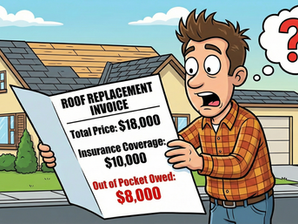How to Vet a Home Improvement Contractor and What to Watch Out For
- Staff
- Jun 17, 2025
- 3 min read
Hiring a home improvement contractor can feel like a leap of faith—but it doesn’t have to be. Whether you're planning to replace your roof, remodel your kitchen, or put on an addition, the right contractor makes all the difference. Here are six smart ways to vet a contractor and protect your investment.

1. Check License and Insurance
Before anything else, make sure the contractor is licensed and insured. A legitimate contractor will have no problem providing this information. A license shows they're authorized to work in your state, and insurance protects you from liability if something goes wrong on the job. Ask for both general liability and workers’ compensation insurance.
2. “Years of Experience” Isn’t the Same as “Years in Business”
Just because someone says they have 20 years of experience doesn’t mean they’ve been in business that long—or that they’ve been running a reputable company. Ask how long they’ve operated under their current business name and whether the business is registered. It’s easy to switch names to escape a bad reputation, so dig a little deeper.

3. Read Online Reviews—With a Grain of Salt
Online reviews on Google, the Better Business Bureau (BBB), and even Facebook can give you a good sense of a contractor’s reputation. Don’t be alarmed by one or two negative reviews—what matters is how the company responded. The BBB is especially helpful for spotting patterns of unresolved complaints or communication issues.

4. Ask for Word-of-Mouth Recommendations
If you know a friend, family member, or neighbor who worked with the contractor, ask about their experience. Firsthand feedback is one of the most reliable ways to vet someone. Don’t be afraid to ask how the process went, whether the project was completed on time, and if they'd hire the contractor again.
5. Ask About Their Preferred Materials and Why
A knowledgeable contractor should be able to tell you not just what products they recommend—but why. For example, do they prefer a specific brand of siding, roofing shingle, or window? The ability to explain their material choices is a strong sign they know their craft and care about quality.
6. Be Wary of the Lowest Bidder
If one estimate is far lower than the others, that’s a red flag. The contractor could be desperate for work, planning to cut corners, or simply not including everything in their estimate. Make sure you’re comparing apples to apples—check the materials, scope of work, warranty, and payment terms. Saving money upfront could cost you much more in repairs down the line.

Final Thoughts
A good contractor is one who communicates clearly, provides detailed estimates, and can back up their work with solid references and credentials. Take your time doing the research—you’re not just hiring someone to swing a hammer; you’re hiring someone to care for your home.
If you live within our service area call us today at (877) 846-9556 or fill out the form below to get started. Or, if your house was affected by a recent storm event, you can also schedule your free inspection online.

























